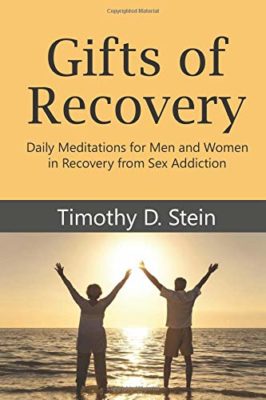By Tim Stein, MFT
Meditation from Gifts of Recovery
“Look at this stone. It has been lying in the water for a very long time, but the water has not penetrated. Look, perfectly dry.” – Cardinal Lamberto from The Godfather: Part 3
Being in recovery is very different than doing recovery activities. We can go to meetings and collect sobriety chips but if the message of sobriety and the experience of recovery do not penetrate, we will stay “perfectly dry” on the inside. Going to meetings and letting the messages in, even the uncomfortable ones, is important for recovery. Making phone calls when we are struggling and trusting the advice given is important for recovery. It is easy to go through the motions. The gifts of recovery come from allowing the Program in and becoming saturated.
When have I simply gone through the motions of recovery? How would internalizing the Program be different? What gifts await me as I absorb all aspects of the Program?

The number one predictor of success in therapy is whether your clients believe you would follow your own advice. Several clients have told me that they truly appreciate not only the therapeutic insights they receive in our work together but also that, since I am in recovery, they believe I better understand their sobriety challenges and recovery path; they assume the advice I give is advice I have taken. (Note: I am open with my clients about being in recovery; a topic for a later blog.)
However, being a sober therapist and following our own advice are two different things. This is an important distinction for all of us who walk the landscape of recovery as both healer and walking wounded. It may be tempting to sit in our office, share our sobriety and recovery wisdom, and make little time in our life for our own continued recovery work. After all, we are the addiction “experts” and we already know what to do. If we do this, we are surrounding ourselves with recovery but not letting recovery in. We undermine our personal recovery and set ourselves up for unnecessary difficulties.
As wounded healers, there are many ways we can absorb the recovery we preach.
- We can maintain a version of the recovery routine we encourage our clients to follow. We may not need the same level of routine that our clients require, but dropping our routine completely is asking for trouble.
- We can acknowledge that we, like our clients, need to hold appropriate boundaries for media, behaviors, and interactions. Again, as our time with consistent, solid sobriety and recovery extends, we typically become more resilient to (less triggered by) sexual themes. However, pretending that we can allow any media content, sexual thoughts, or charged interactions into our experience without consequences is asking for trouble.
- We can maintain connection with our own recovery supports. It is hypocritical of us to preach the importance of peer support and guidance in recovery if we are trying to manage our own recovery in isolation. It is valuable to find a professionals’ recovery support meeting (such as the one at SexAndRelationshipHealing.com) or a professionals 12-Step meeting. At the very least, it is helpful to identify trusted individuals in our recovery community and maintain consistent (multiple times per week if not daily) contact with them.
- We can listen to the advice and guidance we give our clients. More often than I care to admit, I find myself giving my clients advice about rigorous honesty, boundaries, accountability to others, and many other sobriety and recovery topics only to realize that this is advice I should be paying attention to myself. This acknowledgment is humbling and uncomfortable but also powerful.
These are but a few helpful actions we can take. These actions directly help us by inviting the recovery environment we create in our work with clients to permeate us as well. These actions indirectly benefit our clients since we are not only talking the recovery talk but we are also walking the recovery walk; our clients will more easily believe we would take our own advice because we do!
